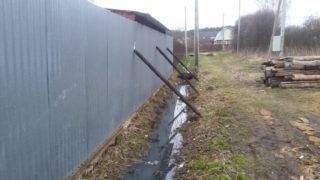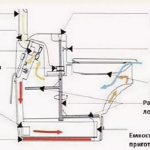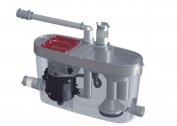Illegal discharge of wastewater can lead to environmental pollution. Sewage will enter the soil and through underground sources into tap water. And this threatens epidemic outbreaks of intestinal infections. Sometimes, residents of private homes ignore waste disposal rules. But if you know what to do if a neighbor drains the sewer into the street or onto your site, you can reason it and protect yourself and your loved ones.
Where can waste be drained?
Human waste before disposal to the soil or water bodies must be thoroughly cleaned. Allowed to drain only clarified wastewater that has reached biological and physico-chemical standards. They are established by sanitary-hygienic rules. The liquid should not contain harmful, toxic, hazardous to health impurities. Particular attention in relation to domestic wastewater is given to bacterial indicators.
It is home drain water that can become a source of intestinal infections and parasitic diseases.
In the presence of a cesspool or sealed septic tank, it is necessary to periodically pump out the contents of the tank with sewage equipment. Its owners conclude agreements with organizations supervising local treatment facilities, where the pumped-out feces are brought. But there are other ways to utilize autonomous sewage. They depend on the design features of the drainage system.
Peat toilet
Life products are interbedded with peat, and when the compartment is filled, the contents are transferred to a compost pit. It is supplemented with grass, peeling vegetables and fruits, and other biodegradable components. As a result, the organics overheats, and after a season an excellent fertilizer ripens for the garden.
To increase the productivity of such amenities, a drainage hose is attached to them to drain excess fluid. It will not be aggressive because it has already been cleaned through a peat filter.
Chemical toilet
Getting rid of the content here is more difficult. Reagents poured into the receiving tank are chemically active. Compost will not come out of the contents of the toilet; it is more likely to harm the soil. Therefore, the waste is poured into an airtight tank, which is evacuated to evacuate. The advantage over the cesspool here is that the help of specialists is required much less often.
Dry closet
A simple device, in which it is necessary to fill or fill in biological products with cleaning microorganisms, produces an environmentally friendly substrate. Bacteria process the contents of the storage tank into organic fertilizer, which can be removed in a compost heap or even mixed with the earth, used to create ridges. If a garden is set up on a personal plot, there will be no issues with disposal of waste.
The only problem is the constant purchase and refill of the biomaterial, since the colonies of microorganisms need to be updated.
Convenient dry closets equipped with cassettes. These are sealed containers filled with a liquid that converts feces into an environmentally friendly substrate. An indicator is installed on the device, which shows that it is time to replace the cartridge with a new one. If it is possible to purchase filler, the old cartridge is washed and reinstalled. Content can also be dumped into a compost pit. The only drawback of such devices is that you need to be careful when removing the cassette. In case of careless handling, it is able to leak and will emit a stench.
Electric toilet
When using such devices, solid fractions are dried and burned, leaving a small amount of ash. It can be dumped into compost. The problem arises with the discharge of fluid. To do this, it is necessary to equip a filtering drainage system.
If a deep cleaning station is installed on the territory adjacent to the house, which is able to clarify wastewater up to 95–98 percent, the drain liquid turns into water for domestic purposes. She can wash the car, water the garden and the garden, even use it for a summer shower.
- Peat toilet
- Cassette Dry closet
- Chemical toilet
- Electric toilet
What to do if the neighbors do not comply with water disposal standards
 Illegal residents of country houses are able to lead a sewer pipe into a storm ditch or even to a neighbor in the garden. Of course, others are not enthusiastic about this. But the problem here is not only an unpleasant odor. Such an attitude to wastewater is dangerous for the environment and the health of people and animals.
Illegal residents of country houses are able to lead a sewer pipe into a storm ditch or even to a neighbor in the garden. Of course, others are not enthusiastic about this. But the problem here is not only an unpleasant odor. Such an attitude to wastewater is dangerous for the environment and the health of people and animals.
First of all, you need to talk with the person responsible for the problems. Perhaps he doesn’t specially dispose of the waste, and, for example, a septic tank burst at him. But such cases are extremely rare, and violators usually ignore others. We have to take tough measures.
Complain if neighbors drain the sewer into your garden or storm ditch, first of all it is necessary to the bodies that control the sanitary and hygienic condition of the settlements. This may be the local branch of Rospotrebnadzor or SES. It is necessary to apply there with a written statement in duplicate, one of which must be endorsed and given to you.
In circulation you must:
- list the problems encountered;
- indicate the manifestations of unsanitary conditions;
- report a threat to human health and the environment.
Well, if you complain not only you, but all the inhabitants of the street. The more appeals, the faster the specialists of Rospotrebnadzor will come with a check. They will make samples of water in stormwater or soil at the place where sewage waste falls and make up an act. This document will be needed if the order of the sanitary authorities to eliminate the violations is ignored, and in order to punish the neighbors for draining the sewage system in your personal plot, you will have to go to court.
Additionally, you can file a complaint with the district prosecutor's office, focusing on a threat to health security. Employees of this body will be required to investigate and prohibit the discharge of waste in public places or in someone else's territory.
Responsibility for draining sewage into a ditch
The sanitary-hygienic and environmental regulations spelled out the rules for the collection, accumulation, transportation, disposal of waste. If they are violated, the perpetrators are subject to administrative punishment.
The main document according to which the penalty for draining sewage in a private house is determined is the Code of Administrative Offenses of the Russian Federation. Section 8.2 of the Code of Administrative Offenses details how the offenders of environmental and sanitary requirements are punished.
For illegal discharge of wastewater penalties:
- for individuals - from 1000 to 2000 rubles;
- for officials - from 10,000 to 30,000 rubles;
- for individual entrepreneurs - from 30,000 to 50,000 rubles;
- for enterprises - from 100,000 to 250,000 rubles.
The offending company will also be forced to suspend operations for up to 90 days. Penalties can be imposed repeatedly until problems are resolved.
If violations have led to illness or even death, the perpetrators are subject to criminal liability.







